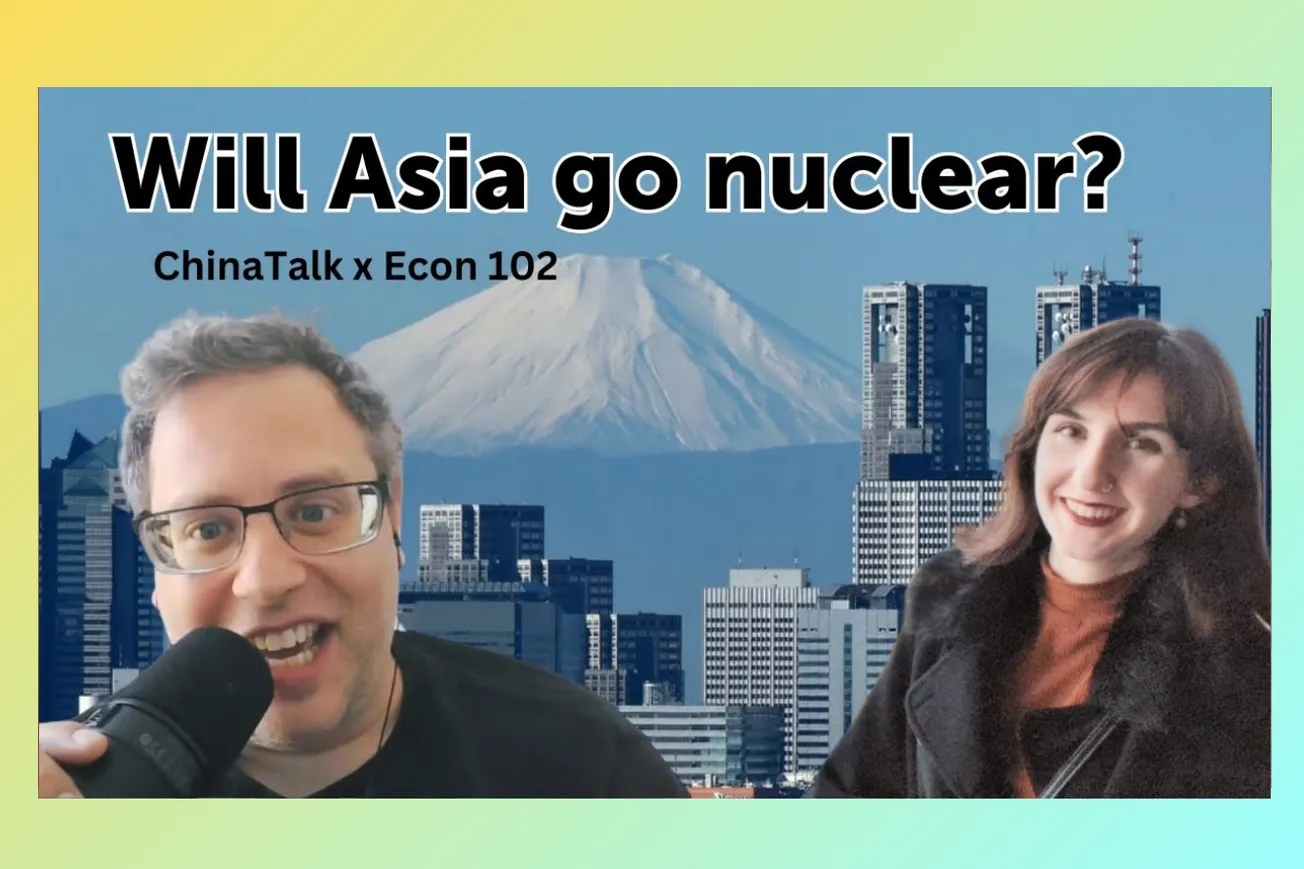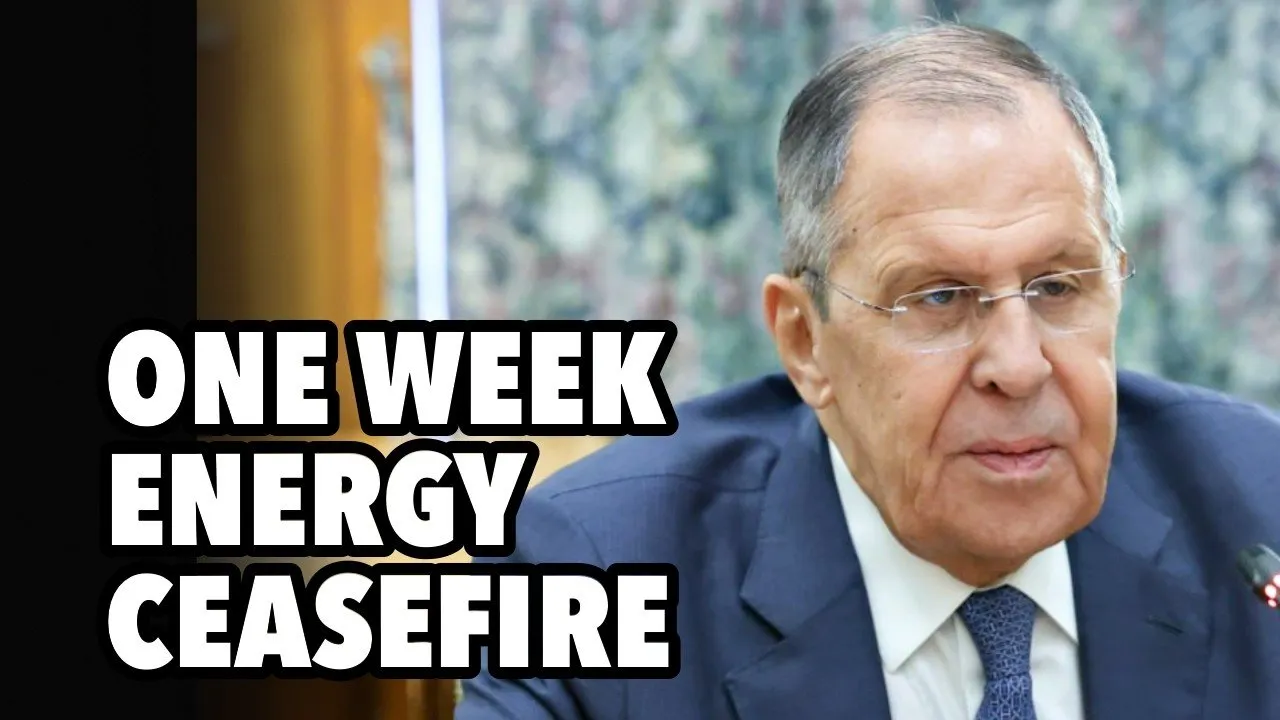Table of Contents
Speaking from Taiwan, Economist Noah Smith argues that Japan and South Korea need nuclear weapons "yesterday," that Xi Jinping is essentially "a 2007-era Fox News dad," and that Taiwan's best diplomatic card might be reaching out to Russia. His contrarian analysis challenges conventional wisdom about everything from China's demographic crisis to the tech industry's influence in Trump's second term, offering a provocative framework for understanding East Asian geopolitics in an age of great power competition.
Key Takeaways
- Silicon Valley's pro-Trump faction will prioritize business-friendly deregulation but may quietly oppose tariffs that hurt tech component sourcing, creating internal coalition tensions
- Japan and South Korea need hundreds of nuclear weapons immediately to stabilize East Asia—more important than any U.S. security guarantee or policy change
- Xi Jinping represents a fundamental departure from the liberalizing trajectory under Jiang Zemin and Hu Jintao, squandering institutional inheritance built by previous leaders
- China's demographic challenges are overstated for the next two decades—working-age population will actually increase until 2027 before declining
- Taiwan's best remaining diplomatic option may be the "Russia card"—leveraging Putin's relationships to influence Chinese decision-making
- China's deflation problem mirrors Japan's 1990s stagnation and could hobble growth through 2032 without structural reforms
- A post-Xi China might accept Finnish-style neutrality for Taiwan with constitutional commitments to eventual reunification that never actually happen
The Tech Right's Constraints on Trump
Trump enters his second term with a fundamentally different coalition than 2016. His traditional allies like Rudy Giuliani were discredited by January 6th, leaving him dependent on what Noah calls "the tech right"—Elon Musk and Silicon Valley figures who became his most influential backers. But influence doesn't mean omnipotence.
The tech faction will prioritize business climate improvements, particularly deregulation that America desperately needs. "We absolutely need deregulation in America," Noah argues. "Progressive love for regulation for regulation's sake is just killing and strangling America." This could finally address permitting delays and construction bottlenecks that have hampered infrastructure development for decades.
But here's where it gets interesting: while tech leaders publicly praise tariffs to stay within Trump's winning coalition, their actual interests may diverge sharply. "When it comes down to the actual nitty-gritty of do you want tariffs that will actually impact the component sourcing for your businesses, things might get different very quick."
Software companies won't be hurt by tariffs since they don't source physical components internationally. But hardware companies like Tesla depend on complex global supply chains. This creates potential for behind-the-scenes lobbying to make tariffs "symbolic" rather than substantive.
The H-1B immigration fight over Christmas revealed these fault lines. Tech companies need high-skilled foreign workers, creating tensions with Trump's base that other industries don't face. Immigration restrictions hit software companies harder than tariffs, while manufacturing tariffs hit hardware companies harder than immigration limits.
Export Controls as the Litmus Test
Noah sees export controls on China as the key indicator of whether Trump has genuine resolve on strategic competition. If the administration starts canceling semiconductor restrictions to benefit companies like Nvidia, "that's a really bad sign."
The internal dynamics are complex. Tech companies generally oppose China because "China shut out Tech"—no Google, no Facebook, no access to the Chinese market. But finance remains pro-China, though less enthusiastically than before as private equity firms struggle to extract investments from China.
Elon Musk represents the wild card. His Tesla Shanghai factory is crucial to the company's global operations, but he's notably kept SpaceX technology away from China. The question is whether his China exposure makes him controllable or whether he's "preparing a counter-strike that will restore American power vis-à-vis China."
Trump himself remains vulnerable to Chinese influence through personal corruption. "Trump can be bought. Trump is a deeply corrupt individual and always has been." China's algorithm changes to promote pro-Trump content on TikTok and Jeff Yass's TikTok investments represent precisely these vulnerabilities.
The Nuclear Imperative: Japan and South Korea
Noah's most provocative argument concerns nuclear proliferation in East Asia. He believes Japan and South Korea need their own nuclear weapons immediately—not American weapons stationed on their soil, but independent arsenals with their own launch codes.
"Great powers do not attack nuclear-armed states," he argues. "They can sabotage them, they can erode their power, they can try to compromise them, they can use all sorts of gray zone warfare, but they do not invade them because they're too scared of nukes."
The numbers matter: Noah isn't talking about minimal deterrents but "hundreds of nukes, maybe even thousands"—enough to level all of China's tier-one cities. "Vaporize the Forbidden City, vaporize the tomb of Qin Shi Huang—it's not worth it to China."
This policy would be more stabilizing than any American security guarantee. Even if the U.S. maintained full commitments to defend every inch of allied territory, "that would still not be as important as Japanese and South Korean nukes."
The timing is crucial. Both countries already possess the technology and materials to go nuclear quickly. China might attempt sabotage or cyber attacks, but would likely fail against advanced industrial democracies with sophisticated defensive capabilities.
Taiwan faces different constraints. "If Taiwan goes nuclear, the invasion will start tomorrow." But if Japan and South Korea nuclearize first, "China will not attack them" and the regional balance stabilizes.
Taiwan's Diplomatic Options: The Russia Card
For Taiwan, facing existential threats without nuclear options, diplomatic creativity becomes essential. Noah suggests an unexpected gambit: reaching out to Russia.
This isn't as crazy as it sounds. Putin personally helped Taiwan develop submarine technology during Chen Shui-bian's presidency, sending teams of submarine scientists to assist with the indigenous Narwhal program. Russia maintains "almost mystical hold on the Chinese imagination" because of historical assistance during both the Republican period and early Communist era.
Xi Jinping still treats Putin as an equal—unlike North Korea or Pakistan, which China openly considers inferior satellites. "Russia and America are the countries that China considers equals in the world."
The strategic logic involves triangulation. Closer Taiwan-Russia ties would ease relations with both India (which maintains pro-Russia sentiment from Cold War alliances) and the Trump administration (where Trump has reflexive pro-Russia sympathies). Vietnam quietly reaches out to Russia; North Korea helps Russia against Ukraine partly to hedge against Chinese dominance.
"If Taiwan somehow hedges its bets by getting close to Russia, maybe that can work and exercise some kind of hold on the Chinese imagination where the people in charge of China will be like, not attack Taiwan because Russia says not to."
Post-Xi Scenarios: Finlandization as Compromise
Noah sees potential for creative bargaining once Xi Jinping leaves power. The current leader is "good at being in charge" but "not good at actually running stuff"—more like a "Fox News dad" than an effective administrator.
A post-Xi leadership might accept what amounts to Finlandization: China grants Taiwan formal independence while Taiwan constitutionally commits to eventual reunification. Both sides save face—China claims temporary independence leading to reunification, Taiwan declares independence with distant reunification promises.
The model requires Taiwan to give up Republic of China claims, renounce foreign alliances, and become neutral. In exchange, China allows genuine independence with reunification talks every five years that never actually produce reunification.
"Taiwan will not have allegiances with any foreign power, and Taiwan becomes neutral, it's finlandization." This diffuses the immediate crisis while preserving core interests for both sides.
But this requires "someone who is good at running stuff" rather than Xi's combination of personal control with policy incompetence. The engagement policy toward China "did not fail nearly as badly as most people now believe"—China liberalized significantly under Jiang Zemin and Hu Jintao before Xi reversed course.
China's Deflation Trap: The Japan Parallel
China faces a classic deflationary depression similar to Japan's 1990s stagnation. The mechanism is Fisherian debt deflation: when heavily indebted entities simultaneously try to pay down debts, reduced consumption drives down prices, making debts more burdensome in real terms, creating a vicious cycle.
"China has a giant tangle of debts from the real estate era of the 2010s," combined with Xi's austerity mindset and massive supply subsidies that flood markets. Producer prices are falling, creating overcapacity that exports can only partially relieve.
The topic is so sensitive that searching for "deflation" in Chinese on major news sites yields no 2024 results. Xi reportedly asked "what's so bad about deflation? Don't people like it when things are cheaper?"—revealing fundamental misunderstanding of macroeconomic dynamics.
This could "hobble China for years" without causing collapse. "We could see Chinese economic weakness through 2030 or even 2032" if Xi doesn't change his approach to macroeconomics.
The solution involves boosting aggregate demand, particularly through healthcare spending that would free households from elder care burdens. But Xi's "2007-era Fox News dad" mentality sees stimulus as creating dependency: "if the government pays for you, people won't work for themselves and take care of their families like they ought to."
The Demographic Non-Crisis
Contrary to popular perception, China's demographic challenges are manageable for the next two decades. The working-age population will actually increase through 2027 due to demographic echoes from earlier baby booms.
"China will have about as many working-age people at the end of this decade as it does right now. It's going to go up then down a little bit." Serious decline doesn't begin until the 2040s, with Japan-level severity around 2045-2050.
This gives China 20 years before demographics become constraining—plenty of time to address economic rebalancing and institutional reform. The Alpha generation (currently 5-15 years old) represents a substantial cohort that will boost working-age population in the 2030s.
China's demographics will actually be "much more favorable than most of their opponents" including America, which is "going through a social spasm where they're cutting off immigration." China benefits from America's self-imposed demographic constraints.
Healthcare as Economic Stimulus
China's healthcare system mirrors America's in fearing that universal coverage will make government too expensive and people too complacent. Both countries avoid the comprehensive systems that other developed economies have successfully implemented.
Universal healthcare would provide massive economic stimulus by freeing working-age people from elder care responsibilities. "Suddenly all these working age people were like, wait a second, I don't have to spend and take care of grandma"—similar to how Social Security boosted Depression-era consumption.
Chinese elderly have "very austere tastes because they grew up really poor," making healthcare spending particularly efficient. "Getting them to consume more, giving like a golden retirement to the Chinese boomer generation as a thank you for all their service to the Chinese state would be a really nice thing to do."
This would "free up younger Chinese people to consume on their own because some of the burden of elder care would be alleviated" while providing the aggregate demand boost needed to escape deflation.
Georgist Solutions to Property Problems
China's property crisis reflects broader taxation dysfunction. Despite officially owning all land through the Communist Party, China refuses to implement property taxes, forcing local governments to rely on land sales for revenue.
"China has always been a low tax country and this has screwed them again and again." The refusal to tax property created the unsustainable model where local governments sold land to fund infrastructure and services.
A Georgist approach—land value taxes that incentive development—would provide sustainable revenue while encouraging productive land use. "A land value tax is simply a property tax plus a tax credit for developing the land. That's the great Georgist idea—property tax with a development incentive."
But China remains "allergic to property tax" for political reasons Noah doesn't fully understand, possibly resembling California's Prop 13 dynamics where existing owners resist taxation of their accumulated wealth.
The Media Ecosystem Transformation
The broader context involves fundamental changes in how political information flows and decisions get made. Traditional media constraints have weakened while social media platforms, especially TikTok, shape public opinion in ways legacy outlets cannot.
"What gets said in the press doesn't matter as much anymore. What the New York Times doesn't matter anymore." Instead, "some shadowy forces are making these decisions in a back room somewhere and you are not privy to them at all."
This resembles America 120 years ago during the Spanish-American War era when "William Randolph Hearst controlled politicians by threatening them with media" and "Mark Hanna" influenced through "caucuses and smoky back rooms."
The result is policy-making dominated by "clandestine sort of back room deals between rich business people, conservative power brokers, and a corrupt president." Citizens feel powerless because "elites are controlling everything and you the regular person can't even get good information."
Lessons from Taiwan's Healthcare Innovation
Taiwan's National Health Insurance system offers interesting lessons for other countries considering universal coverage. They started with specific worker categories, conducted comprehensive audits to set reimbursement rates, then transitioned everyone into the system.
Key innovations include prospective payment (fixed fees regardless of treatment intensity), means-tested premiums, and aggressive cost control through public reimbursement rate negotiations. When providers try to game the system, the government can suddenly remove prescription requirements for certain drugs, cutting off revenue streams.
The model forces hospitals to negotiate directly with suppliers while making successful negotiations public information, creating competitive pressures for cost reduction throughout the system.
Looking Forward: Stability Through Strength
Noah's framework suggests that East Asian stability requires fundamental changes in power distribution rather than diplomatic incrementalism. Nuclear proliferation among democratic allies, Chinese leadership transition away from Xi, and economic rebalancing all point toward structural transformation rather than managing existing trends.
The window for these changes may be narrowing. China's current economic troubles provide opportunity for internal reform, but Xi's political control limits institutional adaptation. Taiwan's diplomatic options remain constrained while military pressures increase. Traditional alliance structures show strain under America's political dysfunction.
But the underlying dynamics suggest reasons for cautious optimism. China's demographic advantages provide time for adaptation. Taiwan's technological capabilities offer economic leverage. Regional democracies possess the resources for independent defense if they choose to use them.
The question is whether political leaders can make necessary adaptations before external pressures force more disruptive changes. Noah's analysis suggests that proactive policy choices—nuclear proliferation, healthcare expansion, property tax reform—could prevent worse outcomes while strengthening democratic positions in great power competition.
The stakes extend beyond East Asia. Success or failure in managing these transitions will shape whether the next decade brings regional stability or escalating conflicts that could reshape the global order. As Noah observes from Taiwan's relaxed streets, there's something worth preserving here—"I hate the idea that China would blow up a place this chill."





